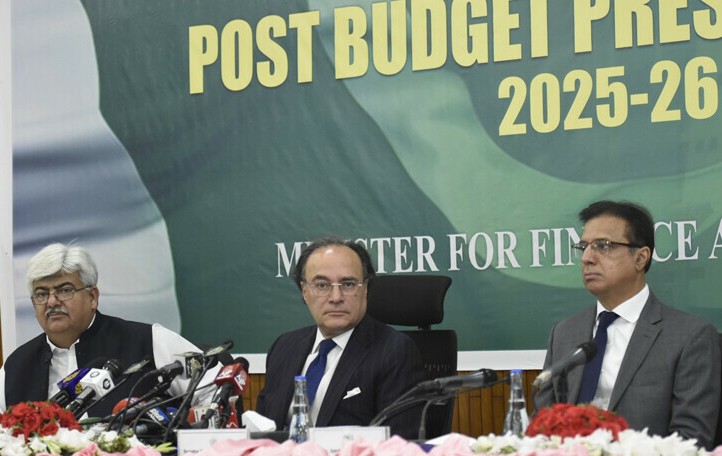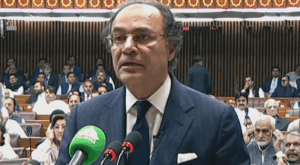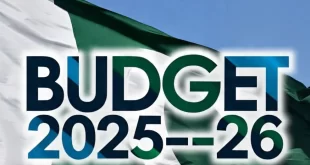
Aftab Maken
ISLAMABAD: Federal Finance Minister Mohammad Aurangzeb said that the government is currently providing relief by borrowing funds. He emphasized that moving forward, all decisions must be made within the government’s financial limits. “Due to the budget deficit, everything we are doing is based on loans,” he explained.
Speaking at a post-budget press conference in Islamabad, he said, “We are trying our best to give as much relief as possible, especially to the salaried class. Last year, we had to impose taxes because international institutions weren’t willing to listen to us.”
Aurangzeb highlighted that the budget includes tariff reforms. He responded to concerns that these changes might reduce tax revenue, explaining that the goal of these reforms is to increase exports, which would benefit the economy in the long run.
He said both he and the Prime Minister wanted to give maximum relief to the salaried class. However, the government’s financial capacity defines how far that relief can go. “This sets the direction of our journey—we need to understand where we want to take the salaried class. That’s why we have divided them into different tax slabs, including the higher-income groups.”
The finance minister also shared that customs duties have been reduced on 4,000 tariff lines. In consultation with the board, the government decided not to impose additional taxes on the agriculture sector, and instead, plans to provide loans to small farmers.
He added that salaries and pensions should be linked to inflation, and the government would work with provinces to promote the development of agriculture and livestock through dedicated policies.
Aurangzeb emphasized that any relief can only be given based on available fiscal space. He pointed out that the current inflation rate is still 7.5%, and stressed the need to reduce federal expenditures. “This year, we’ve kept federal spending growth at 2%. Some areas did see increased spending, but it was necessary. Our budget starts with a deficit,” he noted.
He also explained that tariff reforms were unprecedented in the past 30 years. Out of 7,000 tariff lines, customs duties were abolished on 4,000 and reduced on 2,700, including 2,000 lines directly related to raw materials. These changes will help exporters reduce costs and become more competitive internationally.
“These are just the numbers from the first year,” Aurangzeb said, adding that tariff cuts will continue in the coming years, with a 4% reduction planned in the overall tariff system.
Regarding corporate taxes, he said, “We started with mid-sized corporates, and even though we’ve only reduced their super tax by 0.5%, it’s still an important signal.”
The minister stressed the government’s focus on reducing transaction costs for consumers. “While sellers make profits, it’s the buyers who need relief. That’s why we’ve reduced transaction costs and even removed certain federal excise duties,” he said.
Aurangzeb spoke about the agriculture sector as well. He explained that although the government initially planned to impose taxes on fertilizers and pesticides—a requirement under structural benchmarks to phase out exemptions—Prime Minister’s intervention helped convince the IMF not to impose those taxes.
He referred to last year’s commitment to increase agriculture lending, especially for small farmers, calling it a top priority.
Reflecting on last year’s challenges, the finance minister said, “We had to impose additional taxes because global institutions doubted whether Pakistan could enforce its own tax laws. The laws were there, legislation was happening, taxes existed—but enforcement was lacking. This year, we’ve implemented taxes worth over Rs. 400 billion.”
He noted that the tax-to-GDP ratio is now 10.3%, and projected to rise to 10.9% next year. “Out of the Rs. 2.2 trillion revenue target, only Rs. 312 billion is from new taxes. The rest will come from automatic growth and better enforcement,” he explained.
To improve this, the government will now move towards legal reforms. “We’ll engage both houses of Parliament to amend the laws, because if we fail to enforce taxes, we may need to take additional measures worth Rs. 400–500 billion,” he warned.
Aurangzeb urged Parliament to support the required legal amendments for tax enforcement so the government doesn’t have to take more drastic steps and can reduce leakages in the system.
On international financial institutions, he expressed concern that they still don’t fully accept that Pakistan can enforce its laws. “The laws are in place, legislation is ongoing, and taxes are there—but enforcement is the key issue. This year, we’ve shown that implementation is possible,” he said. He assured that institutional reforms will continue.
Journalist Walkout
Earlier, when the finance minister arrived for the post-budget press conference—accompanied by the Finance Secretary and the FBR Chairman—journalists walked out in protest.
They boycotted the conference due to the absence of a technical briefing, which has been a tradition for the past 20 years after the budget announcement.
Despite the walkout, Minister Aurangzeb went ahead with the press conference without senior journalists present. The hall remained noisy during the event, but the minister continued with the briefing undeterred.
Later, Information Minister Attaullah Tarar held talks with the journalists. Following his assurances, the journalists ended their boycott.
Minister Tarar admitted that the journalists’ concerns were valid and confirmed that the FBR Chairman had also promised to provide a detailed technical briefing soon.
 BeNewz
BeNewz


